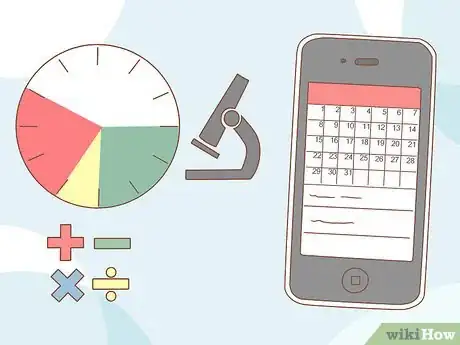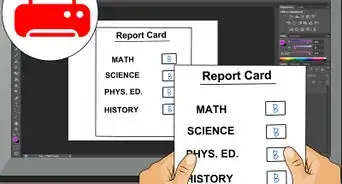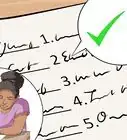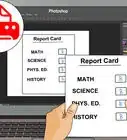This article was co-authored by Alexander Ruiz, M.Ed.. Alexander Ruiz is an Educational Consultant and the Educational Director of Link Educational Institute, a tutoring business based in Claremont, California that provides customizable educational plans, subject and test prep tutoring, and college application consulting. With over a decade and a half of experience in the education industry, Alexander coaches students to increase their self-awareness and emotional intelligence while achieving skills and the goal of achieving skills and higher education. He holds a BA in Psychology from Florida International University and an MA in Education from Georgia Southern University.
There are 7 references cited in this article, which can be found at the bottom of the page.
This article has been viewed 23,739 times.
If you are a student in danger of failing a class but you want to turn things around, this guide is for you. Use these tips to help improve your grades (and learn a little something in the process). The longer you wait to start working toward better grades, the more difficult your task will be. Get started today with Step 1 below.
Steps
Asking for Outside Help
-
1Talk to your teacher. You will save a lot of time and potentially wasted effort by speaking to your teacher directly about what he or she thinks you can do to improve your grade. This will also allow you to identify potential "easy fixes," or minor things you have been doing wrong. Every teacher has different expectations, so this is a critical first step toward getting better marks![1]
- Speak to your teacher in person. Unless your teacher has previously stated a preference for email communication, it is best to approach her before or after class or during office hours. Your teacher is busy and has lots of students, so having a discussion face to face will help her remember who you are and the nature of your situation.
- Express genuine concern when discussing your grade with your teacher. Any teacher is more likely to want to help if she believes you actually care about her class.
- Avoid making excuses or placing blame for your poor performance. Telling your teacher all the reasons why you haven't done your homework only conveys to her that the class is not a priority for you. If you accept responsibility for the situation, your teacher might be more understanding and flexible.
- If your teacher has not explicitly stated that no extra credit is allowed, ask her whether you can do additional work to bring up your grade. Do not make this request if she has already stated that extra credit is not available. If your teacher agrees to allow extra credit work, make sure you complete it and turn it in by the due date.
-
2Attend office hours for help with difficult topics. Your teacher likely holds office hours multiple times per week, and may even be available via email at other times. This is the best resource you will find to improve your understanding of the material, and it is very often under-utilized by students. Teachers often have only a handful of students show up to office hours in an entire semester, and they definitely take notice if you make the effort to attend. [2]
- During office hours, ask specific questions about material with which you are struggling. Your teacher is not going to want to repeat an entire lesson she has already given in class.
- You will get the most out of your teacher if you contact her in advance of your meeting to let her know on which general topics you are seeking help.
- If you make an appointment with your teacher to attend office hours, don't miss it! Teachers (like most people) get very annoyed when they are stood up. If for some reason you can't make it to your appointment, be sure to inform your teacher with plenty of advance notice.
Advertisement -
3Get a tutor. If you feel that your teacher cannot explain the material to you in a way you can understand and if studying on your own doesn't seem to be working, then consider professional tutoring services. A tutor can only assist you with the material; it is still your responsibility to do the necessary work in order to improve.[3] You can find tutors online, through services at your school, or by asking your teacher for recommendations.
- Get individual assistance. Some tutors prefer to tutor groups of students all at once, but you are more likely to get the attention you need by meeting with a tutor one-on-one. This also ensures that you get the most for your time and money (if you are using paid services).
- If you intend to use your school's free tutoring services, request someone with expertise in your particular area of need. Some college tutoring services, for example, might pair you with a general science tutor when you actually need help with microbiology, which requires specialized knowledge.
-
4Ask a friend or classmate for help. If you have friends in your class who are doing well and grasp the material more easily than you do, ask them to help you study. If they are doing well, they are probably putting in study time already, and likely won't mind helping you out. Teaching or explaining complex topics can also help people learn the subject better themselves, so this kind of arrangement is mutually beneficial.
- Form class workgroups with good students. If your class requires group work for things such as laboratory exercises or projects, join a group with students who are hard-working and who understand the material. You will have a hard time making progress on your work if you are in a group with others who are struggling, easily distracted, or who don't take the class seriously. If you are placed in a group that you think will be counterproductive to your goals, politely ask your teacher to switch groups and tell her why.
- If you don't know anyone in your class, use a class email list serve or social media group (such as Facebook) to reach out to classmates who might be willing to help you with the material. Simply explain in your correspondence that you are struggling with certain topics but you are willing to do whatever you can to learn the material and improve in the class.
- Be careful not to rely solely upon classmates to teach you the course topics. After all, they are just learning this stuff, too! If a classmate tells you something about the material that doesn't seem right to you, double-check with other sources (such as the textbook and your teacher). The more sources you can find to confirm the details of the topics of concern, the more certain you can be that the information is reliable.
-
5Utilize online learning resources. If your textbook is unclear and your teacher's explanations go over your head, it might be a good idea to look for supplemental learning resources online. The internet is full of valuable (but also extremely unreliable) information, and chances are good that you can find information online that is easier to understand than the often dense, complex writing found in textbooks.
- Check to see if your textbook has any supplemental online learning materials associated to it. Some publishers have started creating online toolkits to accompany the print version of their textbooks, and many offer free access to these resources if you purchased the book. These online tools are often interactive and present alternative explanations of the topics contained in the book, which might be easier to make sense of. Information about such resources can usually be found inside the cover of the textbook or on the publisher's website. Alternatively, you can ask your teacher.
- Find external online resources. Use an online search engine (such as Google) to seek information about the topics you are studying. Online wikis, discussion forums, and professional journals devoted to your subject of interest are good places to look for additional information. Be careful to avoid reading false or poorly-sourced information. If a website provides no sources for its information, seems full of advertisements or spam, or just doesn't seem legitimate, it is probably best not to trust it. Look for resources written by professionals (for example, articles published in peer-reviewed academic journals) and with lots of cited sources; these are likely to provide accurate and reliable information.
Learning and Retaining Information Better
-
1Attend lecture and labs every day. Even if your teacher does not take attendance, chances are she does notice who does and doesn't regularly show up. You will learn the material more easily and remain in your teacher's good graces if you go to class every day.
- Arrive to class on time. Many teachers find late arrivals distracting and disrespectful. If you come to class early and are prepared to learn when class begins, you are showing your teacher that you care about learning the material and improving your grade.
- If you have to miss a class meeting for a valid reason (such as a scheduled medical procedure, jury duty, or other unavoidable commitment), notify your teacher beforehand. Don't forget to provide your teacher official documentation of the reason for your absence as soon as you return to class. Even if your planned absence is for an "unexcused" reason, your teacher is likely to appreciate being notified ahead of time.
-
2Pay attention in class. Make a conscious effort to focus on your teacher and/or the relevant activities while in class; doing so will help you retain more information and shows your teacher that you are interested. Diligent note-taking is a good way to keep yourself on task and will help you study more effectively later on.[4]
- When taking lecture notes, don't try to copy down every word on your instructor's slides. Rather, focus on listening to what the instructor says and take shorthand notes on that information. Be sure to write legibly and in a style that you can understand later.
- Sit toward the front of the classroom so you can easily see the board/screen. You will be less likely to daydream or become distracted by those around you if you are sitting in plain view of your teacher and have the class out of your field of view. This also helps convey that you are focused on learning, and your teacher is likely to take notice of who regularly sits in the front of the room during lectures.
-
3Review lecture notes immediately after class. Don't wait too long after lecture to review your notes. You are more likely to absorb the material if you review it frequently and without long interruptions. If you don't have time right after class, be sure to go through your notes at least once before you go to bed that night.
- Try to recall what was being shown and said during class when reviewing your notes. This will help stimulate your brain to recall the information more easily. If you have access to lecture slides, go through them at the same time as your notes to help recreate the classroom context. It may help to go through the relevant chapters of your textbook at the same time.
- Don't rush through your notes. In order to reap the benefits of reviewing your notes after class, you'll need to read through them carefully and think about the context of the material. Simply skimming the words in your notebook is less effective in helping you absorb the material (though this is certainly better than not reviewing your notes at all).
-
4Complete assigned readings before lecture. Teachers often design lectures with the assumption that students have already been exposed to the material through assigned readings. You will get the most out of lectures if you read about the subjects prior to attending class. This will also allow you to come to class with any clarifying questions you may have.
- Devote enough time to completing assigned readings that you are sure to at least absorb the main points of the discussion. If you wait until you are already tired on the night before class to begin the reading, you will struggle to get through it and probably won't remember it very well.
- Take notes on the main points of the reading and review them before lecture. This will prepare you to grasp the lecture material more easily and will reinforce the important points of the topic(s).
- While you are reading, think of questions you can ask your teacher in class about the material in the textbook. This can help you link important concepts together and will help you absorb what you read. This also shows your teacher that you are doing the assigned reading before class and taking an active role in your learning.
-
5Participate and ask questions in class. Don't be a passive student. This means asking questions when you have them, answering questions when they are asked, volunteering for demonstrations or activities, and taking an active role in discussions or projects. By doing this, you will learn the material more easily and show your teacher that you are invested in the class. [5]
- Ask open-ended questions (those that cannot be answered by a simple "yes" or "no") that will prompt your teacher to clarify or explain the topic in another way. Examples of questions you can ask are, "How does this relate to the topic we discussed yesterday?" or "What do you mean by that?" or "Can you give an example of how this works?"
- If your teacher does not allow questions to be asked during lecture, write your questions down as they come to you and go to her with them immediately after class or during office hours. If you ask your questions right when (or soon after) they come to you, you will be more likely to boost your understanding when you get an answer.
-
6Know your learning style. Chances are you have certain preferences for the way you learn about things. For example, this might mean that you are a "visual learner" (someone who benefits from seeing images that demonstrate the concepts of interest) or that you are not easily able to absorb concepts from reading textbooks. Knowing how you are best able to learn new subjects can be a major benefit and is something you should consider when deciding how to study.[6]
- Tell your teacher early on in the term about your learning preferences. If the class is designed in a way that does not work for your learning style, ask your teacher for recommendations on how you might be able to modify your study approach to improve your chances of success.
- If you feel you may have a learning issue that you cannot cope with yourself, contact your school's academic counseling or disability services office. If you are designated with a learning disability that requires special accommodations, your teacher will be required to comply.
-
7Get plenty of sleep and exercise. Your brain will function much more effectively if you are physically active and well rested. This will help you absorb and retain the material and more easily recall it during quizzes and exams. [7] [8]
- Set up exercise and sleep schedules for yourself and do your best not to deviate from them. Don't stay up studying or reading past your bedtime unless absolutely necessary, as this will make you less likely to benefit from your work and will limit your ability to learn effectively the next day.
- Experiment with different schedules and physical activities to determine what works best for you. For example, if you benefit from waking up early, schedule your sleep time so that this is possible. If you feel best after taking a short midday nap, build this into your schedule. If you are energized by an evening bike ride, make sure you take a break from studying or reading to do so.
Managing Time Effectively
-
1Rearrange your priorities and/or commitments. Your poor performance in class could be a result of stretching yourself too thin. If you have lots of extracurricular commitments or spend lots of time on leisurely activities, consider dropping one or more of them and allocate that time to studying.[9]
- Some commitments are more easily dropped than others. If you have a job and need to work to pay your rent, then obviously this is a priority you can't easily drop. With some thinking, you should be able to figure out which of your extracurricular activities are unimportant, at which point you can decide whether to let some of them go in the interest of focusing more on your schoolwork.
- Keep a log of your daily time allocation for a few days to a week and look through it to identify blocks of time you could use more efficiently. You might be surprised to find how much time in a given day is spent doing nothing or doing things more slowly or inefficiently than you could. Finding time during the day to study or fit in a workout will be easier once you've eliminated unnecessary downtime or organized your schedule more efficiently.
-
2Create a study schedule. Much like scheduling your sleep and exercise, scheduling your study time will make you more likely to adhere to it.[10] This can also help you divide your time appropriately between various academic commitments. A study schedule can help you avoid wasting time or delaying getting started.[11]
- You can look ahead on your course syllabus to find out what is required of you for the upcoming week. Design your study schedule with this information in mind so you know which classes have heavy versus light homework or reading loads on a given day. If you notice that two different classes have large projects due on the same day, do your best to finish one early so you aren't stuck working on two things at once.
- Depending on your other commitments (such as work or sports practice), your study schedule might vary from day to day or week to week. This could make it hard to remember your schedule on a given day, so you might need to carry a copy with you (for example, printed out on paper or in a calendar app on your smart phone) for easy reference.
-
3Spend an appropriate amount of time on homework. Don't rush through assignments or readings. If you put significant time into your studies, you're much more likely to understand the material and improve your scores. However, you should be careful to avoid spending too much time on any one task. Striking a good balance between your various coursework requirements might mean you cut yourself off a bit early from one task and move on to another.
- If you have trouble figuring out how much time is appropriate for a given assignment or project, ask your teacher for a general guideline. However, keep in mind that only you can know how much time you can realistically spend on homework because this will depend in part on your other commitments.
- As a last resort, you can consider asking a teacher in one class to reschedule a due date if you have a major conflict in another class, such as an exam on the same day. Do not get in the habit of doing this, however, because teachers likely have their own scheduling issues to deal with.
-
4Balance your studies with enjoyable hobbies. It is important to make your happiness a priority! Some activities may be unrelated to your academic goals but play a larger role in your overall well-being. School can be tough, but it is important to try to enjoy life as much as possible. Maintaining an activity you enjoy, even if it feels like you should be studying instead, can have a positive impact on your overall attitude toward school and even on your academic performance.[12]
- Use fun activities as a reward for your hard work. If you complete an assignment ahead of schedule or ace a quiz, take some time to do something you enjoy. This could be anything from watching a movie to going out with friends to taking a day hike - whatever you like!
- While having fun, refrain from dwelling on the things you're not doing. If you spend your hobby time thinking about all the things you have to do, you won't get much out of your 'fun' activity. Focus on being present in the moment while doing things you enjoy and you'll feel much better when you get back to work.
Taking Tests Better
-
1Review material beginning several weeks before a test. In order to improve your ability to recall information during a quiz, test, or exam, you will need to have reviewed it long before the test date. Waiting until the week of the test to study half a semester's worth of material (an approach called "cramming") is a recipe for disaster. It is not possible to effectively absorb that much material in such a short amount of time, so you are better off pacing yourself and spacing your studies out.[13]
- Form a study group early in the term and hold each other to a schedule. This will create accountability for you and your group mates so that you are more likely to follow through. Just make sure you ditch the group if it isn't working for you.
- Ask your teacher several weeks before a test or exam whether it is possible to obtain a study guide. If your teacher obliges, begin working on it immediately and continue with it gradually throughout the term. This will help you identify problem areas or topics you find confusing. The earlier you tackle this, the better your chances of succeeding on the test!
-
2Quiz yourself often. Sometimes reading through your notes or the textbook can create a false sense of understanding. To truly gauge your comprehension of the material, quiz yourself on a range of topics in the days following their introduction in class. This will help you identify those areas you may not understand as well as you thought.
- Create flash cards with key terms and definitions. Look at the terms and try to recall from memory what the definitions are without looking at them. Speak your answers out loud or write them down before checking to see if you are correct. Do this often and you will eventually have those terms committed to memory.
- Ask a friend or classmate to quiz you. This is another way to ensure that possess sufficient comprehension of the material. Having another person assist you with your self-assessment is another way of holding yourself accountable for studying and increases your exposure to important course concepts. Be sure to return the favor!
-
3Tailor your study methods to the test format. In order to adequately prepare for a test or exam, you should know whether the test will be in multiple choice, essay, matching, true/false, or some other format. You don't want to study for an essay test by relying solely on term-definition flash cards, because this study method will not be a good indication of your preparedness for writing an essay.
- For essay format tests, practice writing essay-length descriptions of major topics presented in class. You can do this by selecting bold-faced terms or chapter section headings from your textbook and writing out complete explanations (in your own words) of those topics.
- For multiple-choice or fill-in-the-blank format tests, have a classmate create sample test questions from the important concepts presented in lecture and in the textbook and quiz you on them. You can also check the end of each chapter in your textbook for potential sample study/quiz questions, which they often contain, and do those.
-
4Make yourself comfortable during your test. The last thing you want is to be distracted while taking a test because of some simple factor that could have been prevented. Ensuring that you are physically comfortable will allow you to devote all your attention and mental capacity to the task at hand.
- Get a full night's sleep before your test. If you show up exhausted and sleep-deprived to your test, you will have trouble focusing and recalling the material. Definitely do not sacrifice sleep to cram for a test you haven't adequately prepared for. You are far better off coming to the test well-rested.
- Eat a balanced meal before your test. If you are hungry or thirsty during your test, you will be distracted by your discomfort and your focus will suffer. Just make sure that you don't eat something that will upset your stomach or make you need to use the restroom in the middle of your test (which some teachers will not allow!).
- Bring clothing appropriate to the classroom environment and season. You don't want to be too cold, too hot, too itchy, etc. during your exam. It might be a good idea to bring an extra sweater if your test is being held in a room different from your normal classroom, just in case it is much cooler than you expected.
-
5Come prepared for your test. Take note of the materials you will need for your test. Your teacher will not be happy if you forget to bring a pencil to the exam when she brought it up multiple times in the weeks leading up to the exam. She also might not have any extra materials for you to use during the test.
- Double check that you have all the required test materials the day before the test, and make sure to acquire anything you don't already have. Put them in your backpack or bag the night before your test so you are sure not to forget them when you leave the house.
- Bring extras of anything that could break or run out during your test. Pens, pencils, erasers, and calculator batteries are examples of these kinds of items.
- Arrive early. Coming prepared also means being in your seat and ready to begin the test at the start of class. If you are running late, you will likely be panicky and flustered when you sit down to take the test and this will impact your focus and performance. Your teacher might not even let you take the test if you show up late!
Community Q&A
-
QuestionHow do I raise my grades quickly?
 Alexander Ruiz, M.Ed.Alexander Ruiz is an Educational Consultant and the Educational Director of Link Educational Institute, a tutoring business based in Claremont, California that provides customizable educational plans, subject and test prep tutoring, and college application consulting. With over a decade and a half of experience in the education industry, Alexander coaches students to increase their self-awareness and emotional intelligence while achieving skills and the goal of achieving skills and higher education. He holds a BA in Psychology from Florida International University and an MA in Education from Georgia Southern University.
Alexander Ruiz, M.Ed.Alexander Ruiz is an Educational Consultant and the Educational Director of Link Educational Institute, a tutoring business based in Claremont, California that provides customizable educational plans, subject and test prep tutoring, and college application consulting. With over a decade and a half of experience in the education industry, Alexander coaches students to increase their self-awareness and emotional intelligence while achieving skills and the goal of achieving skills and higher education. He holds a BA in Psychology from Florida International University and an MA in Education from Georgia Southern University.
Educational Consultant Find a tutor that can help you review the information so you're able to understand your lessons easier.
Find a tutor that can help you review the information so you're able to understand your lessons easier.
Warnings
- Remain confident and optimistic. You will find it hard to succeed if you are hard on yourself for struggling with a class. Positive thinking goes a long way.⧼thumbs_response⧽
- Depending on how late in the term you've decided to seek help, it may not be possible to significantly boost your grade.⧼thumbs_response⧽
- Be careful not to tell your instructor that you don't like the subject and avoid saying things like "I'm just not a math person." This might offend him or her, which is the last thing you want to do!⧼thumbs_response⧽
- There are no simple remedies for failing grades; anything you can do to bring up your grade will require substantial work and you must be willing to put in the necessary time and effort.⧼thumbs_response⧽
References
- ↑ http://study.com/articles/10_Ways_to_Turn_Things_Around_When_You_re_Failing_a_Class.html
- ↑ http://proceedings.asmedigitalcollection.asme.org/proceeding.aspx?articleid=2204905
- ↑ Alexander Ruiz, M.Ed.. Educational Consultant. Expert Interview. 18 June 2020.
- ↑ Alexander Ruiz, M.Ed.. Educational Consultant. Expert Interview. 18 June 2020.
- ↑ http://www4.ncsu.edu/unity/lockers/users/f/felder/public/Papers/Prince_AL.pdf
- ↑ Alexander Ruiz, M.Ed.. Educational Consultant. Expert Interview. 18 June 2020.
- ↑ http://www.health.harvard.edu/blog/regular-exercise-changes-brain-improve-memory-thinking-skills-201404097110
- ↑ http://www.mycollegesuccessstory.com/academic-success-tools/college-life-balance.html
- ↑ http://www.mycollegesuccessstory.com/academic-success-tools/college-life-balance.html
- ↑ Alexander Ruiz, M.Ed.. Educational Consultant. Expert Interview. 18 June 2020.
- ↑ http://www.mycollegesuccessstory.com/academic-success-tools/college-life-balance.html
- ↑ http://jhsap.org/self_help_resources/school-life_balance/
- ↑ http://www.mycollegesuccessstory.com/academic-success-tools/college-life-balance.html











































































